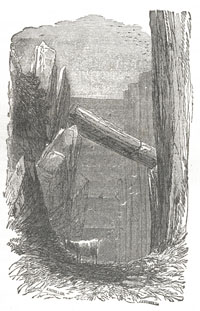The Circuit of Ireland
In the twenty-second year of Donough, Muircheartach determined on a grand expedition for the subjugation of the Danes. He had already conducted a fleet to the Hebrides, from whence he returned flushed with victory. His first care was to assemble a body of troops of special valour; and he soon found himself at the head of a thousand heroes, and in a position to commence "his circuit of Ireland." The Danish chief, Sitric, was first seized as a hostage. He then carried off Lorcan, King of Leinster. He next went to the Munster men, who were also prepared for battle; but they too yielded, and gave up their monarch also, "and a fetter was put on him by Muircheartach." He afterwards proceeded into Connaught, where Conchobhar, son of Tadhg, came to meet him, "but no gyve or lock was put upon him." He then returned to Oileach, carrying these kings with him as hostages. Here he feasted them for five months with knightly courtesy, and then sent them to the Monarch Donough.
After these exploits we cannot be surprised that Muircheartach should be styled the Hector of the west of Europe. But he soon finds his place in the never-ceasing obituary. In two years after his justly famous exploit, he was slain by "Blacaire, son of Godfrey, lord of the foreigners." This event occurred on the 26th of March, A.D. 941, according to the chronology of the Four Masters. The true year, however, is 943. The chroniclers briefly observe, that "Ard-Macha was plundered by the same foreigners, on the day after the killing of Muircheartach."[9]
Donough died in 942, after a reign of twenty-five years. He was succeeded by Congallach, who was killed by the Danes, A.D. 954. Donnell O'Neill, a son of the brave Muircheartach, now obtained the royal power, such as it was; and at his death the throne reverted to Maelseachlainn, or Malachy II., the last of his race who ever held the undisputed sovereignty of Ireland. But it must not be supposed that murders and massacres are the staple commodities of our annals during this eventful period. Every noteworthy event is briefly and succinctly recorded.
We find, from time to time, mention of strange portents, such as double suns, and other celestial phenomena of a more or less remarkable character. Fearful storms are also chronicled, which appear to have occurred at certain intervals, and bard frosts, which proved almost as trying to the "men of Erinn" as the wars of the Gentiles, black or white. But the obituaries of abbots or monks, with the quaint remarks appended thereto, and epitomes of a lifetime in a sentence, are by no means the least interesting portion of those ancient tomes. In one page we may find record of the Lord of Aileach, who takes a pilgrim's staff; in another, we have mention of the Abbot Muireadhach and others, who were "destroyed in the refectory" of Druim-Mesclainn by Congallach; and we read in the lamentation of Muireadhach, that he was "the lamp of every choir." Then we are told simply how a nobleman "died in religion," as if that were praise enough for him; though another noble, Domhnall, is said to have "died in religion, after a good life." Of some abbots and bishops there is nothing more than the death record; but in the age of Christ 926, when Celedabhaill, son of Scannal, went to Rome on his pilgrimage from the abbacy of Beannchair, we are given in full the four quatrains which he composed at his departure,—a composition which speaks highly for the poetic powers and the true piety of the author. He commences thus:—
"Time for me to prepare to pass from the shelter of a habitation,
To journey as a pilgrim over the surface of the noble lively sea;
Time to depart from the snares of the flesh, with all its guilt;
Time now to ruminate how I may find the great Son of Mary;
Time to seek virtue, to trample upon the will with sorrow;
Time to reject vices, and to renounce the demon.Time to barter the transitory things for the country of the King of heaven;
Time to defy the ease of the little earthly world of a hundred pleasures;
Time to work at prayer in adoration of the high King of angels."
The obituary notices, however, were not always complimentary. We find the following entry in the Annals of Clonmacnois:—"Tomhair Mac Alchi, King of Denmark, is reported to go [to have gone] to hell with his pains, as he deserved."

The Grey Man's Path, Giant's Causeway
Notes
[9] Muircheartach.—This prince obtained the soubriquet of Muircheartach of the Leathern Cloaks. The origin of this appellation has not been precisely ascertained.
